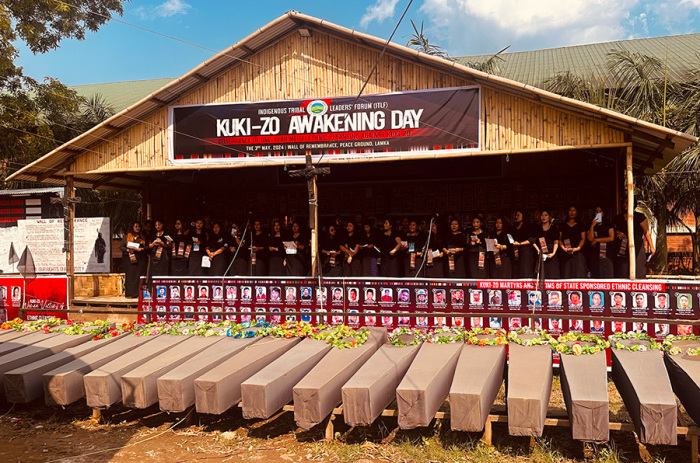USCIRF: Designate India as a ‘country of particular concern’
India's Kuki-Zo Christians mark first anniversary of violence

In its 2024 report, the United States Commission on International Religious Freedom has recommended that India be designated as a “country of particular concern” due to persistent and egregious violations of religious freedoms. The recommendation came even as Kuki-Zo Christians in Manipur state solemnly marked the first anniversary of ongoing violence, which shows no signs of abating.
The USCIRF’s 2024 annual report highlights a series of laws — such as the Unlawful Activities Prevention Act, Foreign Contribution Regulation Act, and the Citizenship Amendment Act — and governmental actions that have systematically targeted religious minorities, including Christians, under the Bharatiya Janata Party’s Hindu nationalist policies. The other persecuted minorities are Muslims, Sikhs, Dalits, Jews and tribals, or indigenous communities, according to the USCIRF.
In early 2023, the Indian Ministry of Home Affairs suspended the FCRA license of the Centre for Policy Research, impacting its operations as it scrutinized state responses to discrimination against minorities, the U.S. panel noted, adding that journalists like Teesta Setalvad were targeted for their reporting on past communal violence, particularly anti-Muslim riots in Gujarat back in 2002.
Reports from NGOs tally 687 violent incidents against Christians in the past year alone, the USCIRF said in its report. Notably, in January, attacks by Hindu mobs in Chhattisgarh led to the destruction of churches and forced reconversion attempts against Christians, it pointed out.
The violence in the northeastern state of Manipur was even more severe, with over 500 churches and two synagogues destroyed during ethnic clashes in May 2023, displacing more than 70,000 people.
The violence in Manipur, which erupted on May 3, 2023, has led to the deaths of at least 185 Kuki-Zo tribal Christians. On the first anniversary of the ongoing violence in Manipur, the Kuki-Zo community gathered for a solemn public prayer meeting in the morning, followed by a candlelight vigil in the evening at the mass burial site, where 87 of their community members are interred side by side.
The violence in Manipur began following a Manipur High Court directive that contemplated granting tribal status to the majority Hindu Meitei community, which would enable the Meitei to purchase land in territories traditionally inhabited by the Kuki-Zo tribes. The judicial consideration sparked widespread protests among the Christian tribal communities, which rapidly deteriorated into violent clashes characterized by the spread of disinformation and extremist rhetoric beginning May 3, 2023.
Both Prime Minister Narendra Modi and Home Minister Amit Shah have been criticized for their delayed and inadequate responses to these incidents, USCIRF said, noting that the U.N. has called for deeper investigations into these episodes of violence, highlighting the Indian police’s inability to control the situation.
Violence against Muslims has been particularly pronounced, with several mosques demolished and individuals attacked by mobs under the pretext of enforcing cow slaughter laws, the report added. The cow is regarded as sacred by some Hindu sects.
In the northern state of Haryana’s Nuh district, communal violence escalated dramatically after a Hindu procession in July, resulting in significant casualties and the destruction of religious sites, the report said.
Internationally, the Indian government’s actions have not gone unnoticed, the USCIRF remarked. Incidents like the assassination of Sikh activist Hardeep Singh Nijjar in Canada and subsequent allegations of Indian involvement have strained diplomatic relations, the panel said.
The legal landscape has also grown increasingly hostile toward religious freedom, the report added. Thirteen states have enacted “anti-conversion” laws that severely restrict the ability of individuals to change faiths, and initiatives against so-called “love jihad” continue to stoke communal tensions. “Love jihad” is a controversial term used by some groups in India to allege that Muslim men are targeting women of other religions for conversion to Islam through marriage.
In light of these developments, the USCIRF recommended that India be designated as a CPC under the International Religious Freedom Act. Countries designated as a CPC face the possibility of negative consequences, including potential crippling sanctions.
India’s Ministry of External Affairs has rejected the report, accusing the USCIRF of interfering in India’s ongoing national election, according to The Wire.
The commission also suggested imposing targeted sanctions against individuals and entities responsible for severe violations of religious freedom. Further, it called for incorporating religious freedom concerns into U.S. foreign policy dialogues and improving engagement with religious communities and defenders of human rights in India.
Additionally, the USCIRF urged the U.S. Congress to take more active measures in addressing these issues, including conditioning financial assistance and arms sales on improvements in India’s religious freedom landscape.





























